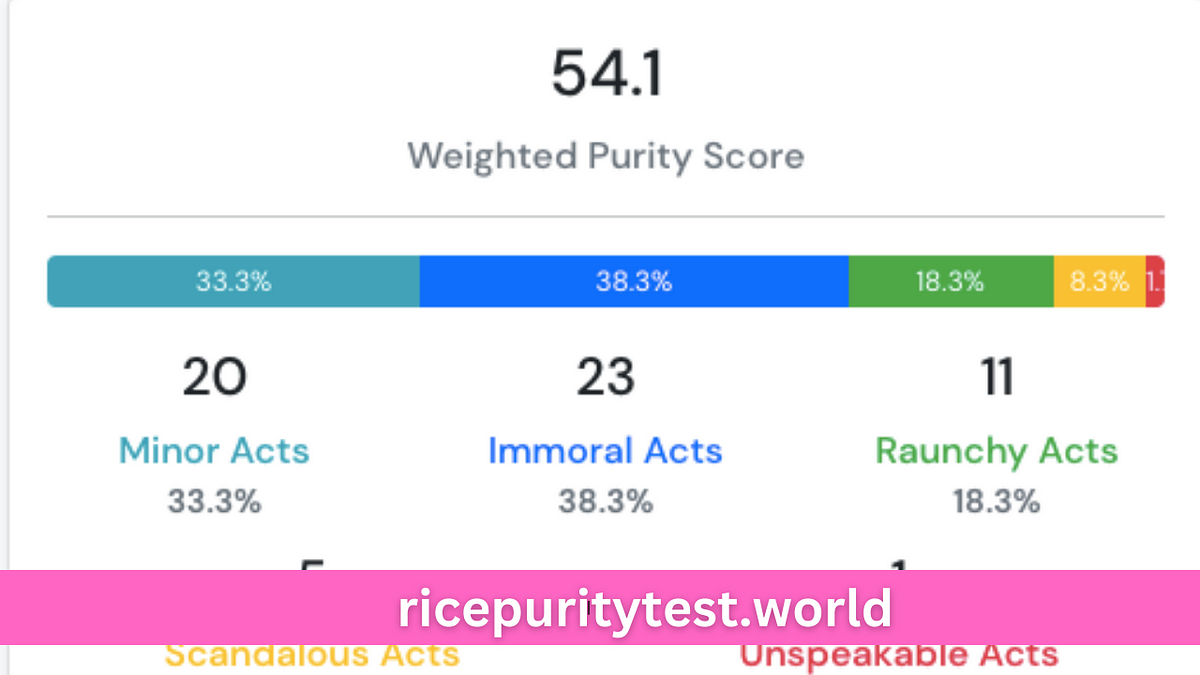News
Unlocking the Mystery of the Rice Purity Test

In the landscape of internet culture, there exist myriad rites of passage, benchmarks that serve as both amusement and insight into the human experience. One such phenomenon is the Rice Purity Test. Originating from Rice University in the 1980s, this test has become a ubiquitous presence on college campuses and online forums alike. It promises to gauge the “purity” of an individual based on their responses to a series of questions covering a wide array of life experiences. Despite its popularity, the Rice Purity Test remains shrouded in mystery for many. In this article, we delve deep into the origins, mechanics, and cultural significance of this intriguing assessment.
Unveiling the Origins
The genesis of the Rice Purity Test can be traced back to the hallowed halls of Rice University, located in Houston, Texas. Although the exact circumstances of its creation are murky, it is believed to have emerged as a form of entertainment among students during the 1980s. Initially circulated within the confines of the university, the test gradually gained traction beyond its campus borders, spreading through word of mouth and early internet forums.
Understanding the Mechanics
At its core, the Rice Purity Test consists of a questionnaire comprising a series of statements or questions, each addressing a specific aspect of human behavior or experience. Participants are instructed to indicate whether they have ever engaged in the activities described by selecting options ranging from “Yes,” “No,” to “Not Applicable/Not Sure.” The test covers a wide spectrum of topics, including but not limited to relationships, substance use, academic integrity, and adventurous pursuits. After completing the questionnaire, participants receive a score reflecting their perceived level of “purity,” with lower scores indicating a higher degree of life experience.
Exploring the Cultural Significance
Despite its seemingly frivolous nature, the Rice Purity Test holds a mirror to societal norms and values, offering insights into prevailing attitudes towards sexuality, risk-taking, and personal conduct. For many, taking the test is a rite of passage, a way to bond with peers and compare experiences in a lighthearted manner. However, beneath the surface, it also sparks discussions around societal expectations, peer pressure, and the complexities of human behavior.
Impact on Individuals and Communities
The implications of the Rice Purity Test extend beyond mere amusement, influencing how individuals perceive themselves and others. In some cases, the test may inadvertently reinforce harmful stereotypes or stigmatize certain behaviors, contributing to feelings of shame or inadequacy among those who diverge from societal norms. Conversely, for others, it serves as a source of validation or solidarity, as they realize they are not alone in their experiences or choices.
Navigating Controversies
Like any cultural phenomenon, the Rice Purity Test is not without its controversies. Critics argue that it promotes a narrow, judgmental view of human behavior, reducing complex individuals to a numerical score. Furthermore, concerns have been raised regarding its potential to perpetuate harmful ideologies or trigger traumatic memories for some participants. However, proponents counter that it is ultimately up to individuals to interpret the test in a way that is meaningful to them, and that it can foster open dialogue and self-reflection when approached with nuance and empathy.
Evolution in the Digital Age
With the advent of the internet, the Rice Purity Test has undergone a digital transformation, proliferating across social media platforms, online forums, and dedicated websites. Today, countless variations of the test exist, catering to diverse audiences and cultural contexts. Some versions incorporate multimedia elements such as images or videos, while others offer customizable questions or scoring systems. Despite these innovations, the essence of the test remains unchanged: to provoke introspection and spark conversations about the complexities of human experience.
Conclusion
The Rice Purity Test may have humble origins, but its impact on contemporary culture is undeniable. From college dormitories to cyberspace, it continues to captivate the imaginations of individuals seeking to navigate the labyrinth of human existence. As society evolves and norms shift, so too will the interpretations and applications of this timeless assessment. Whether viewed as a lighthearted diversion or a profound reflection of societal values, one thing remains certain: the Rice Purity Test will endure as a testament to the enduring quest for self-discovery and understanding.
Read Also: Investment FintechZoom: Navigating the Future of Financial Technology


















